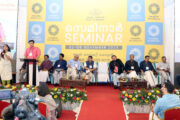Indian youth avoids destinations reeling under mass tourism: Study

Owing to the growing awareness through the Internet and various activations, young Indians are in the forefront to curb carbon footprint by opting for a sustainable holiday. The Cox & Kings study reveals a whopping 87 per cent of the respondents feel strongly about saving the environment. The study also highlights the deciding parameters for accommodation, adventure type, the rise of voluntourism, transport and travel logistics for the young Indian travellers. It was based on the survey carried out in key cities including Delhi, Mumbai, Chennai, Kolkata, Bengaluru, Ahmedabad and Thiruvananthapuram among 5,000 youth aged between 20-35 years.
About 74 per cent of the respondents agreed to skip destinations that are reeling under the problem of over tourism or mass tourism. In order to minimise the pressure on local resources, the conscious Indian traveller avoids visiting the place. Tourism’s global carbon footprint has increased, accounting for about 8 per cent of global greenhouse gas emissions; transport and food sectors are also significant contributors. While the service providers at one end are modifying the business models to contribute positively, the travellers are becoming more conscious than ever, the study reveals.
Close to 72 per cent of the participants said, while on a holiday in Europe they would prefer to hire a bicycle or simply take a bus/train to explore. While there is very little that can be done to contain the greenhouse emissions by air-travel, millennials in India wish to compensate by choosing the right local travel.

Places to eat are chosen either through local or online research. A restaurant providing locally sourced food, liquids with no straws, minimal or no usage of single-use plastics top the list for about 67 per cent of the young Indian travellers.
The demand of ‘green hotels’ and accommodation facilities is also on the rise. Around 89 per cent of the respondents agreed to have chosen their stay post researching their sustainable practices. Be it a luxury accommodation facility or budget one, the young Indian explorer would choose the one that prioritises local community, local procurement of resources, solar power usage, waste treatment facilities and technology-intervention to minimise carbon footprints. About 59 per cent of survey participants mentioned they reused their bath towels and asked for a no-replacement from the hotel staff.
Voluntourism, an emerging trend of travel linked to doing good while on the go is also a big hit. About 92 per cent of the young Indians expressed interest in participating in plogging events, rural tours, farming trips, NGO visits, cause-based trips and sustainable treks/hikes. Merging altruism with travel is highly satisfying for the Indian millennials.
Cox & Kings promotes responsible / sustainable tourism and is committed to work with its partners to reduce the global carbon footprints. Its adventure wing Trip 360˚ has also launched rural trips, city green getaways, sustainable treks etc. to endorse responsible tourism.






